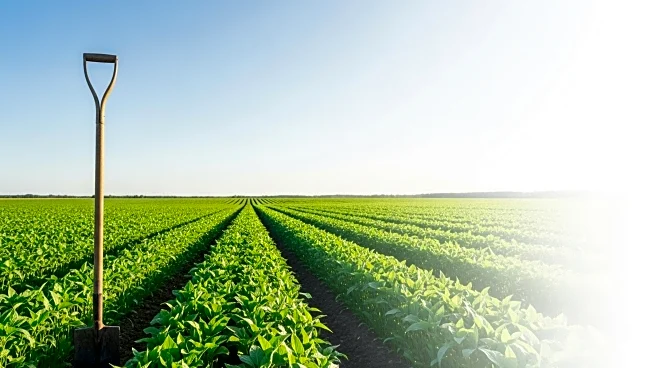What is the story about?
What's Happening?
The global demand for food is increasing due to population growth and rising incomes, which are expected to reach 10.3 billion people by the mid-2080s. This surge in demand is compounded by policies that redirect food crops for biofuel production, reducing the availability of food crops for human consumption. In the United States, a significant portion of corn and soybean oil is used for ethanol and diesel fuel production, respectively. Additionally, policies supporting organic agriculture and local foods, along with restrictions on farm consolidation, further constrain food supplies. The decline in agricultural productivity growth since the 1990s poses additional challenges, exacerbated by climate change and pest resistance.
Why It's Important?
The increasing demand for food due to population growth and income changes poses significant challenges for global food security. As dietary preferences shift towards more diverse and protein-rich diets, the efficiency of food production decreases, requiring more land and resources. The use of food crops for biofuel production further strains food availability, impacting both the environment and food security. These challenges necessitate policy changes and investments in agricultural productivity to ensure adequate food supply. The situation highlights the critical role of farmers and the need for innovative solutions to meet future food demands.
What's Next?
Governments and stakeholders must address the challenges of expanding food supply by investing in agricultural research and development. Policies may need to be reevaluated to balance biofuel production with food security. The agricultural sector must adapt to climate change and develop strategies to combat pest resistance. Collaboration between governments, researchers, and farmers will be essential to develop sustainable practices and technologies that enhance productivity and ensure food security for the growing global population.
Beyond the Headlines
The shift towards biofuel production and dietary changes has broader implications for environmental sustainability. The conversion of forested lands to agriculture for biofuel production contributes to carbon emissions and environmental degradation. Ethical considerations arise regarding the prioritization of biofuel over food security. Long-term strategies must consider the environmental impact and ethical dimensions of food production policies, ensuring a balance between energy needs and food availability.
















